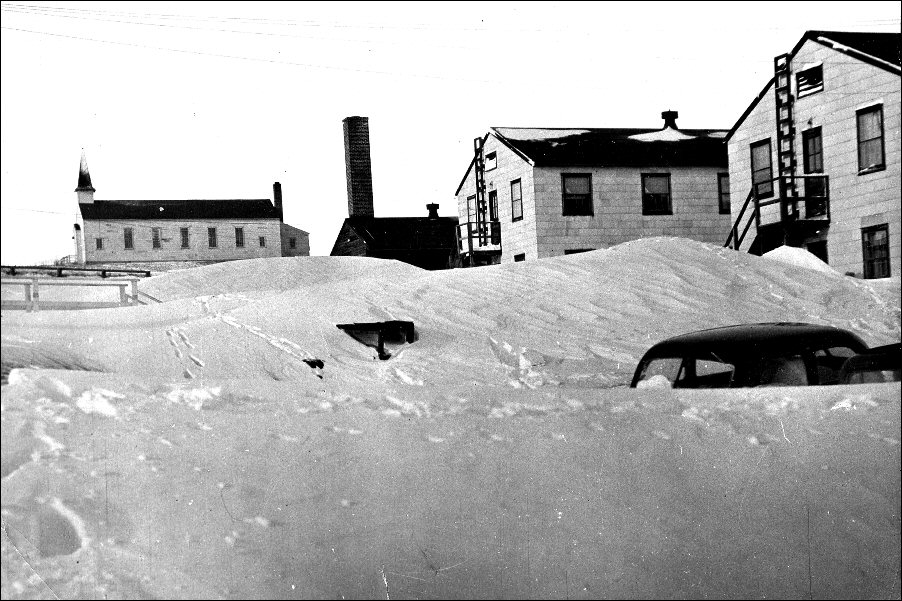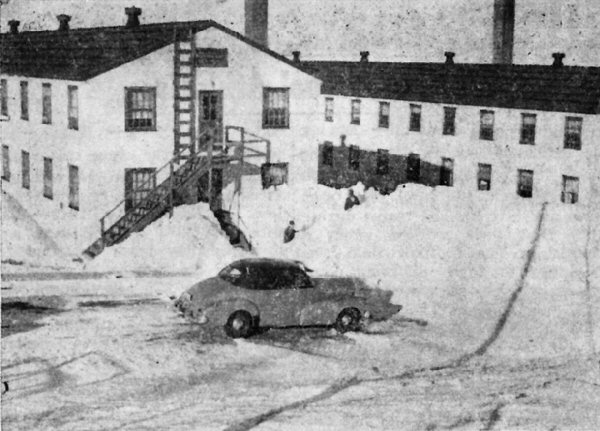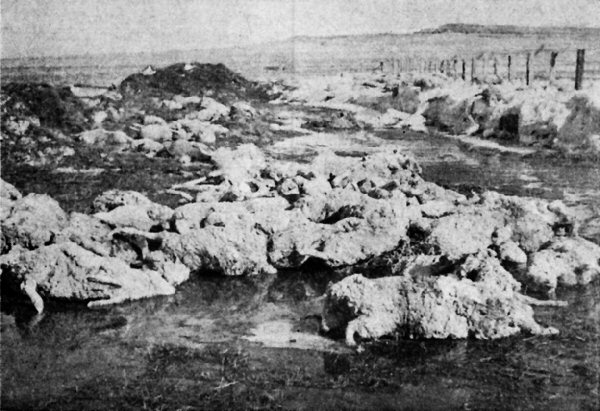


Igloo, A History; page 41; "In 1949, a severe blizzard struck during the first week of January. The storm paralyzed traffic in the area, cancelled school sessions, and interrupted mail deliveries, telephone service, and railroad travel. In the wide open, treeless area around Igloo, the winds and snow were particularly merciless."
| Vol. 1 No. 18 | page 12 | May 9, 1952 |

There was no hint as Saturday, New Year's Day, 1949, dawned fine and clear, that one of the worst blizzards in the history of the West was about to strike with paralyzing fury. Although storm warnings had been issued, the deceptive mildness of the day in part negated the effectiveness of the foreboding weather predictions. Many residents of the Depot took advantage of the fine holiday to visit distant relatives and friends and many college students, home for the Christmas vacation, started back to school. Some made the trip safely ahead of the storm, some were snowbound many days, and some suffered severe hardship. The blizzard, borne by winds of 44-mile velocity, began as a heavy snow fall Sunday afternoon, January 2nd, and continued its blinding, swirling, stinging onslaught for three days before abating. When again the sun shone brightly forth it, indeed, "looked upon a world unknown," for familiar landmarks were obliterated by mountainous drifts of hard-packed snow; sixplexes and duplexes were all but buried and many families were virtually sealed into their houses by the drifts piled eaves-high against doors and windows. Cars that had been parked along the streets and in front of the barracks were lost to sight under twelve-foot drifts, or indicated their presence by the length of aerial or the protruding corner of a top.
Adding to the severity of the storm was the below-zero temperature accompanying it. Work was at a standstill during the blizzard as it was utterly futile to attempt any operations until the storm should spend itself but many crews were on constant duty maintaining the necessary facilities of the Post. Although considered all in the day's work by the employees concerned, many instances of exceptional devotion to duty involving personal hazard and hardship were later brought to light. Mrs. Claudia Marsh, alone on duty at the Station Hospital, with ten patients to care for, was not relieved for 32 hours. Since the cooks were unable to reach the hospital, Mrs. Marsh had the preparation of meals added to her busy schedule until Miss Margaret Marasco came to her assistance in this field the second day. Mrs. Helen Ingman, a nurse formerly employed at BHOD, was called to the Robert Fields' home to deliver a baby boy as the doctor found it impossible to negotiate the solidly drifted streets. Fortunately, Mrs. Ingram lived only a half block away and was able to make her way through the driving snow to usher the new life into a cold and stormy world. That evening the mother and baby were carried to the hospital on a stretcher. Cloyse Lanphear, Harvey Tiffany and Tony Dill of the Heating Section were marooned for the duration of the storm at the heating plant in the magazine area with only candy bars to sustain them. Luther (Pop) Thompson had a similiar experience at the Renovation boiler plant. Ben Geary, foreman of the Heating Section, fought his way through the blinding blizzard at 2:00 o'clock in the morning to relieve the operator at the central heating plant and remained at his post until afternoon of the following day. Stationery firemen Johnson, Dorner, Redmond, Benton, Nelson, Jones and Gayhart remained at their respective posts throughout the duration of the storm. In recognition of their outstanding service, letters of commendation were awarded by Col. Samuel F. Fletcher to John E. Johnson, David Benton, John Dorner, Thomas Redmond, Troy Dill, Harvey Tiffany, Peter O. Nelson, Cloyse Lanphear and Howard Jones. Fire Chief Bingham and the firefighters on duty at the onset of the storm remained at their posts rendering assistance wherever needed and standing by for emergencies throughout the critical period. At the height of the storm Chief Bingham and Louis Gukeisen tied ropes about them and made their way to the hospital, bringing assistance to those stranded there and to the fireman alone in the hospital boiler room. Continuing their rescue operations, Chief Bingham and the fire department patrol undoubtedly saved the lives of sheepmen who were lost in the swirling storm while trying to care for their sheep in the Combat area. "Guests" who were fed and bunked in the fireman's dormitory during this period were two stationery firemen, one telephone operator, Mrs. Keva Peterson, who was on duty for nineteen hours, the firefighters and guards on duty, a lieutentant who had been quartered at the BOQ, and snowplow maintenance crews who had become stranded while trying to cut their way through the drifts. Among the guards who had a not-to-be-forgotten experience with the storm were Van Goodman and Cap Sealey who stalled their carry-all in a drift in the Combat area while taking relief to the fireman stationed there. They were forced to spend two days in Building 1813 in the Combat area and they, too, subsisted on candy bars to which they fortunately had access. Mr. Ferdinand Glomb, then chief of the Surveillance Division, found himself on a snow-blocked train in western Nebraska as he was returning from Florida to BHOD. During several days spent on the stalled train, Mr. Glomb proved himself a real samaritan as he purchased food as long as his funds held out for fellow travelers who were not financially prepared for such an emergency.
The appalling loss of livestock in this region was reflected in the toll taken of the sheep being grazed on the Depot. Drifting helplessly before the bitter gale and smothered by the driving ice and snow, hundreds of sheep piled against the fences to perish and were soon covered by mounting drifts.
When the storm subsided Depot residents took stock of the effects of the blizzard. Attics with open louvres were found driven full of snow and the immediate problem of removing the burden before the ceilings gave way confronted the householders. Some carried the snow out in bushel baskets, some in wash tubs, and one resourceful resident, seeing that his ceiling was about to collapse, punctured the bulge with a poker and caught the deluge in his washing machine. Snowplow crews of the Roads and Grounds section under the direction of "Tiny" Mickelson, continued the herculean task of opening streets and roads and removing as much as possible of the unprecedented snowfall. Many whose larders had been sadly depleted during the holiday and the subsequent seventy-two hour storm, hastened to lay in supplies of staples to carry them through possible future emergencies. It was well that they did for severe weather with storm succeeding storm was to continue for weeks to come.
While there was little actual suffering or hardship among the residents of BHOD due to the untiring efforts of personnel and crews on duty, the blizzard of 1949 will stand as one of the most memorable and unforgettable events in the memories of all who experienced it. For months its disastrous and devastating effects were to be seen in the mute eloquent bodies of cattle, sheep and horses strewing the plains, and the mounds of dirty snow long piled in city streets. To all who witnessed it, the blizzard of '49 will servie as a criterion by which other blizzards will be gauged and measured. It is to be hoped that the force and fury of the '49er will stand unchallenged for many years to come.

After the Blizzard of '49 the frozen carcasses of livestock dotted the landscape.
This picture shows sheep which were grazed by neighboring ranches on the military reservation near
a fence in the combat area where they had drifted and smothered or froze to death during the storms' fury.
| Date | Temperature | Wind Velocity | Humidity | Bar. Pressure | Precip. | Remarks | ||||
|---|---|---|---|---|---|---|---|---|---|---|
| high | low | high | low | high | low | high | low | |||
| Jan. 1 | 36 | 11 | 8 | 2 | 65 | 60 | 30:20 | 29:90 | none | clear |
| Jan. 2 | 39 | 12 | 12 | 2 | 74 | 60 | 29:80 | 29:70 | trace | cloudy - snow blowing |
| Jan. 3 | 25 | -2 | 38 | 12 | 89 | 70 | 30:18 | 29:80 | trace | blizzard - snowing |
| Jan. 4 | 2 | -4 | 44 | 36 | 70 | 70 | 30:19 | 29:98 | trace | snow blowing |
| Jan. 5 | 15 | 1 | 41 | 22 | 70 | 65 | 30:10 | 29:91 | trace | snow blowing |
| Jan. 6 | 32 | 16 | 40 | 21 | 69 | 62 | 30:25 | 30:10 | none | clear |
| Jan. 7 | 40 | 24 | 15 | 3 | 63 | 55 | 30:25 | 30:13 | none | clear |
| Jan. 8 | 48 | 25 | 16 | 3 | 68 | 64 | 29:82 | 29:72 | none | P cloudy |
| Jan. 9 | 33 | -5 | 12 | 1 | 80 | 70 | 30:30 | 30:60 | trace | snowing |
| Jan. 10 | 10 | -9 | 21 | 8 | 85 | 80 | 30:75 | 30:62 | trace | snowing |
| Jan. 11 | -2 | -7 | 23 | 4 | 70 | 69 | 30:76 | 30:70 | .08" | cloudy |
| Jan. 12 | 13 | -3 | 2 | 1 | 75 | 65 | 30:60 | 30:50 | none | clear |
| Jan. 13 | 29 | 9 | 4 | 2 | 70 | 62 | 30:50 | 30:32 | none | clear |
Feb. 9, 1949; Black Hills Ordnance Depot column; In response to a request made by Lt. Col. Fletcher to the Office Chief of Ordnance, two "weasels" were received Monday Morning, Jan. 31. These vehicles have been put in first class condition by the Maintenance Shop, fully winterized, and will be available for emergency relief work both on and off the post in the event of another blizzard.